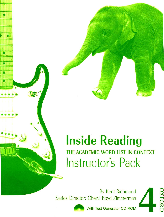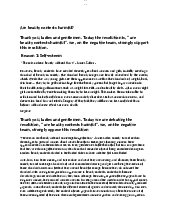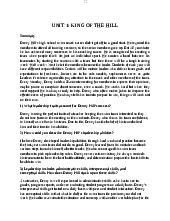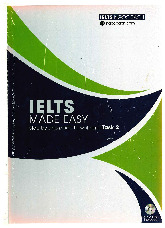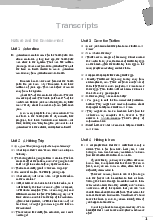















Preview text:
lOMoARcPSD|46342985
POLITICS AND DEVELOPMENT
FINAL TEST SAMPLE MCQ QUESTIONS
POLITICAL EQUALITY / INEQUALITY/ SOCIAL JUSTICE/ RIGHTS 1.
Which ideology calls for equal rights of men and women? A. Socialism B. Liberalism C. Feminism D. Marxism
2. The statement that: “Men by nature are equal” is given by: A. Hobbes B. Plato (Locke) C. Rousseau D. Laski
3. The demand for legal equality was raised in: A. 17th century B. 18th century C. 19th century D. 20th century
4. What is not equality of opportunity? A. Access to education B. Access to health care C. Equality in ambition D. Equality of safe housing
5. For Marxist, the fundamental equality is: A. Social equality B. Political equality C. Economic equality D. Legal equality
6. Which of the following statements is correct?
A. Liberty and Equality are opposed to each other
B. Liberty and Law are opposed to each other
C. Liberty and Equality are supplementary
D. Liberty and Equality are contradictory
7. Steve and John are brothers. While John is a successful doctor, Steve is a
sportsperson. Steve enjoys fame and people often give him special treatment. This
difference of treatment is a result of:
A. Different choices and preferences
B. Difference in the equality of status
C. Inequality in access to basic goods such as education and healthcare D. Luck. 8.
In the US, the case for racial preferences in student admissions is made on the argument of: A. Uniformity B. Equality lOMoARcPSD|46342985 C. Diversity D. Fraternity
9. What are liberals views on equality?
A. Poor class exploited by rich class
B. Politics controlled by rich class
C. Provide minimum level of welfare
D. State control of public resources
10. Who is associated with “Communism”? A. Hegel B. Marx C. Rousseau D. None 11. The purpose of Feminism is A. To weaken women B. To empower women C. To exploit women D. None of these above
12. Which of the following promote social justice? A. Economic opportunity B. Educational opportunity C. Workplace opportunity D. All of the above
13. Which of the following are the principles of social justice? A. Social rights B. Civil rights C. Political rights D. All of the above
Explanation: The 3 principles of social justice are, i.
Civil rights like the right to life, liberty, and property ii.
Political rights like the right to vote and iii.
Social rights are related to equal social opportunities.
14. Which of the following is a current social justice issue? A. LGBTQ+ rights B. To win election C. Orthodox society D. Culture
15. Which of the following is a natural right? A Right to life B. Right to vote C. Right to educate D. Right to drive
16. The famous quote “In a country well governed, poverty is something to be ashamed of.
In a country badly governed, wealth is something to be ashamed of. “ given by A. J.S.Mill B. Plato C. Aristotle lOMoARcPSD|46342985 D. Confucius
17. An international institution that work for justice is A. Civil services
B. International Court of Justice C. IMF D. WTO 18. Justice is administered by: A. Executive B. Judiciary C. Legislature D. Political parties 19.
The essential principles of modern justice is that A.
Judges should be part of executive
B. Judges should be under the control of the Head of State
C. There should be independence of judiciary
D. Judges should be under the control of the electorate 20. People get proper justice in: A. Dictatorship B. Totalitarian state C. Monarchy D. Democracy 21.
State’s failure to provide individuals with basic necessities of life such as food and housing, is an example of: A. Political Injustice B. Ecconomic Injustice C. Social Discrimination D. Gender Inequality
22. Our political rights and participation are insured only when our______
A. Social needs are being taken care of B. Basic needs C. Cultural needs D. Security needs
23. The term “justice” is derived from the word “jus” which is a word from: A. Latin language B. Greek language C. English language D. French language
24. Is hunger in the world a result of
A. A shortfall in the global food supply
B. The growth of the world’s population beyond the food supply
C. The uneven distribution of the world’s food supply
D. The steady decline in the world’s food supply 25. What is the veil of ignorance?
A. The position from which the original contractors work to establish the principles of justice. lOMoARcPSD|46342985
B. The device that deprives the original contractors of certain information about
themselves in order to model impartiality.
C. The first of Rawls's two principles of justice.
D. The principle of recruiting new employees where contractors put a fabric curtain
to ensure they cannot see faces of the candidates.
27. What is the main ethical dilemma presented by the “Trolley problem”?
A. Saving a group of people vs. saving a single individual
B. Following the law vs. breaking the law
C. Avoiding the trolley vs. confronting it
D. Avoiding the dilemma vs. ignoring it
POLITICAL INTEREST GROUPS & PARTIES
26. Organizations that pursue the common interests of groups of people by attempting
to influence the making and implementation of governement policy are known as: A. Social movements B. Interest groups C. Lobbyists D. Political parties E. Policy communities
27. This theory assumes that governments will be influenced by various interest groups
and will not be biased for or against any of those groups: A. Rational choice theory B. State centered theory C. Pluralist theory D. Marxist theory E. Institutionalist theory
28. A public interest group pursues policies that they believe will provide what to society: A. Purposive incentives B. Collective benefits C. Solidary incentives D. Selective benefits E. Lower taxes
29. State-centered theory assumes that:
A. Interest groups are ineffective because they generally do not have enough popular support
B. Interest groups are effective only when they have a large number of members
C. The demands of interest groups are too much of a burden on government
D. Interest groups are ineffective because the state is independent of social forces
E. Interest groups are effective only when they rely on the courts.
30. Which means of influencing public policy is generally seen as ineffective by interest
groups and those who analyze them: lOMoARcPSD|46342985
A. Taking their case to the public
B. Lobbying Members of Parliament C. Lobbying central agencies D. Using the legal system E. Lobbying a cabinet minister
31. Which of the following strategy is NOT of Interest groups? A. Approaching Lawmakers B. Public media C. Demonstrations D. Approaching FBI
32. In order to be effective in influencing government policy interest groups require: A. Lawyers B. A permanent headquarter C. A large number of members D. Money and expertise E. Access to media outlets
33. An interest group with a formal structure, established membership base, and paid staff is commonly known as a(n):
A. Institutionalized interest group B. Effective interest group C. Special interest group D. Self-interest group E. Public interest group
34. A network of groups and individuals that seek major social and political change who
act outside of established political institutions is commonly reffered to as: A. Public interest group B. Old social movement C. Policy community D. Social movement E. New social movement
35. New social movements have increasingly relied on the following tactic to pressure governments:
A. Creating interactive websites to appeal to younger people
B. Circulating petitions in their community C. Operating protests D. Civil disobedience
36. _________ is a group of people who come together to contest elections and hold power in the government. A. Pressure Group B. Political Party C. Interest Group D. Business Lobby lOMoARcPSD|46342985
37. Political parties reflect fundamental ______in a society. Parties are about a part of the
society and thus involve PARTISANSHIP. A. Social divisions B. Economic divisions C. Religious divisions D. Political divisions
38. A government is expected to base its policies on the line taken by the ________. A. Opposition parties B. Ruling party C. President D. Parliament
39. The ___________ and the United Kingdom are examples of a two-party system. A. United States of America B. Russia C. China D. Canada
40. Which of the following is an example of multi party system? A. India B. New Zealand C. Canada D. All of the above
41. Which of the following statements are true about political parties?
A. The proportion of those who said they were members of some political party
was lower in India than in many advanced countries like Canada, Japan.
B. b) Over the last three decades, the proportion of those who report to be members of
political parties in India has gone down steadily.
C. The proportion of those who say they feel ‘close to a political party’ has also gone down in India. D. None of the above.
42. According to the given classification, there are _________ subservient parties in the People’s Republic of China. A. seven B. six C. nine D. eight
43. __________________ is the ruling party in the People’s Republic of China. A. Maoist Party B. Chinese Communist Party
C. Chinese National Democratic Party D. China Communist League
44. There are _________ political parties in the People’s Republic of China. A. seven B. six C. nine D. eight lOMoARcPSD|46342985
45. Political parties exercise power through which of these functions? (a) Parties contest elections
(b) They play a decisive role in making laws for a country
(c) They form and run governments (d) All of the above 46. Partisan means:
(a) Party which runs the government
(b) Affair of the state or the science of government
(c) A person who is strongly committed to a party
(d) A group of people who come together to promote common beliefs POLITICS & ECONOMY
47. What is Keynesian economics?
A. The belief in laissez-faire economic policy
B. The use of central planning to promote growth
C. The claim that global trade is damaging to workers
D. The belief that the government should “prime the pump” to get the economy going 48. What is monetary policy?
A. Controlling the amount of money in the economy
B. Raising taxes to fund road-building
C. A tax that is higher for rich people than for poor people D. The ability to print money
49. How can fiscal policy affect interest rates?
A. Government borrowing can drive them up B. Taxes drive them up C. Taxes drive them down
D. Expenditures drive them down
50. Which of the following is not a method states use to affect their economies? A. Monetary policy B. Fiscal policy C. Command policy D. Regulary policy
51. What are NOT the main complaints of those who object to international financial institutions?
A. Global trade hurts the environment
B. Global trade causes a loss of jobs
C. The whole system as biased in favor of developed states
D. Global trade causes inflation
52. Which of the following is an argument that sophisticated proponents of state intervention in the economy might make?
A. Sometimes only the state can solve problems coordinating the efficient allocation of capital.
B. For markets to work, we need effective political institutions so that people can manage risk and uncertainty.
C. If the state doesn't invest in human capital, others are unlikely to do so as effectively,
and in the absence of human capital investment everyone will be economically worse lOMoARcPSD|46342985 off. D. All of the above.
53. Who is a well known proponent of market based approaches to the economy? A. Milton Friedman B. Milton Bradley C. John Maynard Keynes D. Gosta Esping-Anderson
54. Which country is considered to have first experienced the Industrial Revolution? A. The United States B. The United Kingdom C. India D. France
55. Which of the following is not a task assumed by many states? A. Investing in human capital B. Policing C. Regulating mental life
D. Developing and maintaining infrastructure
56. What do political scientists and others mean by “political economy”?
A. An economy that has been “politicized” such that nothing works.
B. The study of ways in which politics and the economy affect one another.
C. An economy that makes people more political.
D. Trick question: political scientists don't talk about that.
57. Which of the following do (many) states not typically do as they try to manage their economies? A. Shape the money supply
B. Declaring by fiat that the economy will meet specified production targets
C. “Stimulus” spending during recessionary periods D. Taxation
58. What might happen if the gas & oil prices increase? A. Unemployment rate decreases B. More world trade agreements C. Supply chain disruption
D. Inflation rate could be higher than usual
59. Which of the following statement is FALSE? A.
To democrats, economic policies benefit low-income and middle-income families B.
To Republicans, advocate for supply-side economics that primarily
benefits businesses and investors.
C. Republicans support Keynesian economic theory that government should spend its way out of a recession D.
Republicans support the pursuit of prosperity without government interference
60. What factors influence how much impact Republican or Democratic presidents have on economic performance? lOMoARcPSD|46342985
A. Recessions, wars and prior presidents’ policies
B. Recessions, trade war and prior presidents’ policies
C. Recessions, trade war and trade barriers
D. Recessions, supply chain disruptions and public policies
DEMOCRACY & ELECTIONS
61. Which of the following statements are true about Democratic Government?
A. Democratic Government is a legitimate Government.
B. Democratic Government may be slow, less efficient, and not always very responsive or clean.
C. Democratic Government is the people’s own Government.
D. All the above given statements are true.
62. Democracy is preferred over dictatorship everywhere except _________. A. India B. Bhutan C. Iran D. Nepal
63. Which of these factors play a role in the economic development of a country?
A. Cooperation from other countries. B. Size of the population
C. Economic priorities adopted by the Government. D. All of the above
64. Among the below given countries, in which country is the highest percentage share of
national income concentrated in the hands of the top 20% of the population? A. South Africa B. USA C. U.K D. China
65. Which of the following statements are true?
A. Non-democratic regimes often turn a blind eye to or suppress internal social differences.
B. Ability to handle social differences, divisions and conflicts is thus a definite plus point of democratic regimes.
C. Democracies usually develop a procedure to conduct their competition. D. All of the above.
66. Among the below given countries, in which country do people have the maximum
belief that their vote makes a difference? A. Australia B. Vietnam C. India D. Bangladesh
67. ___________ stands much superior to any other form of Government in promoting
dignity and freedom of the individual. A. Theocracy B. Oligarchy C. Dictatorship lOMoARcPSD|46342985 D. Democracy
68. Which of the following statements are true?
A. In democracy, the majority and minority opinions are not permanent.
B. In democracy, it is also necessary that rule by majority does not become rule by majority
community in terms of religion or race or linguistic group.
C. Democracy remains democracy only as long as every citizen has a chance of being in
majority at some point of time.
D. All of the above statements are true.
69. Which of the following statements are true?
A. Democracies have had greater success in setting up regular and free elections and in
setting up conditions for open public debate.
B. Most democracies do not fall short of elections that provide a fair chance to everyone and
in subjecting every decision to public debate
C. Democratic Governments have a very good record when it comes to sharing information with citizens
D. Democracies are free of corruption.
70. Who regarded, 'life ,liberty and property as inalienable rights of men'? A. Locke B. Aristotle C. Rousseau D. Hobbes
71. Who put forward the economic theory of rights: A. Locke B. Ricardo C. Karl Marx D. Hitler
72. According to Marxists, rights are: A. privileges of all people B. privileges of all classes
C. privileges of a particular class safe guarded by law
D. privileges for economically weaker sections
73. Who says “ where there is no law there is no freedom”. A. Rousseau B. Green C. Locke D. Laski.
74. Which of the following describes best the “sleeping dogs theory” in the United States?
A. Government encourages people to get involved in civil society but American citizens refuse
B. Government encourages American citizens to raise their voice publicly for the Congress’ decision-making process
C. The American government prefers American citizens not to arouse their outrage in
uncertainties to prevent the vote-out of officials in the next election.
D. The officials use violence to keep American people silent.
75. Which can best describe the American “modern democracy”?
A. American citizens engage in every political decisions lOMoARcPSD|46342985
B. Because of the “rule of anticipated reactions”, people should vote in the government's
election and express their opinions to American candidates.
C. If instability aroused, the people will participate—vote, contribute time and money,
organize groups, and circulate petitions—and that elected officials know this.
D. Democracy is rooted from civil society, The U.S. government promotes civil society
to improve its democracy and liberty. INTERNATIONAL RELATIONS
76. Given below are two statements, one labelled as Assertion(A) and the other labelled as
Reason(R). Select the correct answer from the codes given below.Assertion (A) Idealist
approach to International Relations advocates Morality. Reason(R) It held that morality leads state to development.
A. Both A and R are true. R is the correct explanation of A.
B. Both A and R are true. But R is not the correct explanation of A C. A is true, R is false D. A is false, R is true.
77. Why has the United Nations often been ineffective in maintaining international peace and security?
A. Its members regularly withhold funds for the UN.
B. The states of the international system place no importance on the resolutions adopted by the UN.
C. It fails to adopt resolutions unless there is agreement among the five
permanent members of the Security Council. D. All of the options.
78. Which of the fol owing statements is true?
A. The only role of the UN is to maintain international peace and security.
B. American troops have become a common feature of UN peacekeeping forces
and are commanded by the Secretary General of the UN.
C. In nearly al cases during the post-Cold War era, UN peacekeeping forces
have achieved success in establishing peace. D. None of the options
79. What is Traditional Peacekeeping?
A.UN forces are placed under the command of the permanent members of the Security
Council and are used to forceful y pacify disputing parties B.
Traditional peacekeeping is characterised by the establishment of UN forces between
the disputants once they have agreed to a ceasefire C.
Traditional peacekeeping occurs when civilians working for the UN are used to
administer and re-establish civilian institutions once hostilities between disputants have ended D. None of the options
80. Which approach to International Relations was introduced as a movement against Liberalism? A. Neo-liberalism B. Realism C. Idealism D. Conservatism lOMoARcPSD|46342985
81. Which among the following is not a core element of Realist Approach? A. Statism B. Survival C. Self Help D. All of the above
82. Which country has the second military budget? A. USA B. China C. Russia D. India
82. Which country is the largest spender in military? A. USA B. China C. Russia D. India
83. Which is the first multinational company in the world? A. French Indochina Company B. United Dutch Asia Company C. Dutch East Asia Company D. Dutch West Asia Company
84. Among those, which is NOT a free trade agreement that Vietnam participated in. A. UKVFTA B. EUVFTA
C. Singapore – Vietnam Free trade agreement D. RCEP
85. The core assumption of Neorealism is that
A. Institutions are the key actors in international relations
B. Cooperation is an important feature of relations between states
C. Anarchy is a key determinant of actor behaviour
D. The importance of absolute gains outweighs that of relative gains
86. . Since the end of the Cold War, the United Nations has been A. Reformed B. Strengthened C. Weakened D. Dominated
87. The United Nations acts primarily to improve A. Conflicts between countries B. Conflicts within countries
C. Conflicts within regions of countries
D. Conflicts within individual cities
88. The United Nations Charter is concerned with A. Mainly economic issues
B. Mainly international cooperation issues C. Mainly gender issues D. Mainly democracy issues 89. Diplomacy is A. About the use of force lOMoARcPSD|46342985 B. About the use of persuasion
C. About the use of not listening to others’ concerns
D. About being sent abroad to lie for the good of one’s country ELECTIONS
90. __________________ are those in which the electorate cast their votes directly for
a candidate, candidates or political parties. A. Direct elections B. Indirect elections C. Competitive elections D. Democratic elections
91. What type of election did the Socialist Republic of Vietnam’s government organize
to vote for the president of Vietnam? A. Direct elections B. Indirect elections C. Competitive elections D. Democratic elections
92. What has become the most visible symbol of the democratic process? A. Wars B. Polls C. Elections D. None of the above
93. What type of democracy is one in which citizens directly participate in the day-to-
day decision-making and government running? A. Possible B. Direct C. Indirect D. Immediate POLITICAL CULTURE
94. American pay little attention to politics until aroused by scandal, war, conflicts, disasters
– then they vote politicians out. This phenomenon is called: A. “Lying dogs” theory
B. “Sleeping voters” theory C. “Sleeping dogs” theory D. None of the above
95. Americans are prouder of their system than foreigners are of theirs, so greater faith in ____________ A. The government B. Democracy C. Legitimacy D. Sovereignty
96. Which of the following term describes the political culture of Mexico? lOMoARcPSD|46342985 A. Parochial B. Subject C. Participatory D. None of the above
97. _______ are better educated, wealthier, more participatory therefore have more political competence. A. Poor people B. Poor white people C. Elites
D. People who graduated tertiary education
98. Which of the following is Indian political culture? A. Pro-people democracy B. Hindu caste system
C. Hindu and Muslim peacefully organized system
D. British colonization’s constitutional monarchy.
99. Which of the following describes Russian political culture?
A. Centralized government which prevents people developing market economy
B. Centralized government which allows people developing economy as long as they avoid politics
C. Centralized government which ensure people achieve human rights protection
D. Democratic government which ensure people have freedom of expression and promote the opposite opinions
100. Which of the following is one of the determinants of Russian political culture?
A. Catholic religion with Russian cultural characteristics B. Orthodox church
C. A mixture of Christian and Muslim religion
D. The August Revolution 1945 and Berlin’s Wall.
